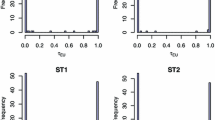Abstract
Miyamoto's generic utility theory (GUT) is a bilinear form that captures a diverse set of utility formulations. The present study, using mixed gambles, experimentally evaluates GUT in a fashion similar to the Chechile and Cooke and the Chechile and Butler studies, but employs a novel method of analysis. The reasons for the new method is to solve a fundamental flaw with the regression approacch used in the earlier experiments and to solve a problem of model overfit. Several participants from the earlier Chechile and Butler experiment are now recognized as being consistent with the GUT representation, but many are not. A new experiment, with actual economic consequences for the participants, does not support GUT. Suggestions are provided for subsequent research studies assessing the GUT class of models.
Similar content being viewed by others
References
Becker, J.L. and R.K. Sarin. (1987). "Lottery Dependent Utility," Management Science 33, 1367–1382.
Bernoulli, D. (1738). "Specimen Theoriae Novae de Mensura Sortis," Comentarii Academiae Scientiarum Imperiales Petropolitanae 5, 175–192.
Burnham, K.P. and D.R. Anderson. (1998). Model Selection and Inference: A Practical Information-Theoretic Approach. New York: Springer.
Chechile, R.A. and S.F. Butler. (2000). "Is 'Generic Utility Theory' a Suitable Theory of Choice Behavior for Gambles with Mixed Gains and Losses?" Journal of Risk and Uncertainty 20, 189–211.
Chechile, R.A. and A.D.J. Cooke. (1997). "An Experimental Test of a General Class of Utility Models: Evidence for Context Dependency," Journal of Risk and Uncertainty 14, 75–93.
Chechile, R.A. and R.D. Luce. (1999). "Re-Analysis of the Chechile-Cooke Experiment: Correcting for Mismatched Gambles," Journal of Risk and Uncertainty 18, 321–325.
Chew, S. (1983). "A Generalization of the Quasilinear Mean with Applications to the Measurement of Income Inequality and Decision Theory Resolving the Allais Paradox," Econometrica 51, 1065–1092.
Edwards, W. (1962). "Subjective Probabilities Inferred from Decisions," Psychological Review 69, 109–135.
Fishburn, P.C. (1983). "Transitive Measurable Utility," Journal of Economic Theory 31, 293–317.
Handa, J. (1977). "Risk, Probabilities, and a New Theory of Cardinal Utility," Journal of Political Economy 85, 97–122.
Huygens, C. (1657). Tractatus de Ratiociniis in Ludo Aleane. Amsterdam.
Kahneman, D. and A. Tversky. (1979). "Prospect Theory: An Analysis of Decision Under Risk," Econometrika 47, 263–291.
Karmarkar, U.S. (1978). "SubjectivelyWeighted Utility:ADescriptive Extension of the Extension of The Expected Utility Model," Organization Behavior and Human Performance 21, 623–638.
Kirk, R.E. (1995). Experimental Design: Procedures for the Behavioral Sciences. Pacific Grove, CA: Brooks/Coles.
Luce, R.D. (1988). "Rank-Dependent, Subjective Expected-Utility Representations," Journal of Risk and Uncertainty 1, 305–332.
Luce, R.D. (1990). "Rational Versus Plausible Accounting Equivalences in Preference Judgments," Psychological Science 1, 225–234.
Luce, R.D. (1992). "Where does Subjective Expected Utility Fail Descriptively?" Journal of Risk and Uncertainty 5, 5–27.
Luce, R.D. (2000). Utility of Gains and Losses: Measurement-Theoretical and Experimental Approaches. London: Lawrence Erlbaum Publishers.
Luce, R.D. (2001). "Reduction Invariance and Prelec'sWeighting Functions," Journal of Mathematical Psychology 45, 167–179.
Luce, R.D. and P.C. Fishburn. (1991). "Rank and Sign Dependent Linear Utility Models for Finite First-Order Gambles," Journal of Risk and Uncertainty 4, 29–59.
Luce, R.D. and P.C. Fishburn. (1995). "ANote on Deriving Rank-Dependent Utility Using Additive Joint Receipts," Journal of Risk and Uncertainty 11, 5–16.
Luce, R.D. and L. Narens. (1985). "Classification of Concatenation Measurement Structures According to Scale Type," Journal of Mathematical Psychology 29, 1–72.
Machina, M.J. (1989). "Dynamic Consistency and Non-Expected Utility Models of Choice Under Uncertainty," Journal of Economic Literature 27, 1622–1668.
Madansky, A. (1989). "The Fitting of Straight Lines When Both Variables Are Subject to Error," Journal of the American Statistical Association 54, 173–205.
Miyamoto, J.M. (1988). "Generic Utility Theory: Measurement Foundations and Applications in Multiattribute Utility Theory," Journal of Mathematical Psychology 32, 357–404.
Miyamoto, J.M. (1992). "Generic Analysis of Utility Models." InWard Edwards (ed.), Utility Theories: Measurements and Applications. Boston: Kulwer Academic Publishers.
Myung, I.J., M.R. Forster, and M.W. Browne. (2000). "Guest Editors' Introduction: Special Issue on Model Selection," Journal of Mathematical Psychology 44, 1–2.
Prelec, D. (1998). "The Probability Weighting Function," Econometrica 66, 497–527.
Quiggin, J. (1982). "A Theory of Anticipated Utility," Journal of Economic Behavior and Organizations 3, 323–343.
Quiggin, J. (1993). Generalized Expected Utility Theory: The Rank Dependent Model. Boston: Kluwer Academic Publishers.
Schmeidler, D. (1989). "Subjective Probability and Expected Utility with Additivity," Econometrica 57, 571–587.
Smith, V.L. (1982). "Microeconomic Systems as an Experimental Science," The American Economic Review 72, 923–955.
Tversky, A. (1967). "Additivity, Utility, and Subjective Probability," Journal of Mathematical Psychology 4, 175–201.
Von Neumann, J. and O. Morgenstern. (1947). Theory of Games and Economic Behavior. Princeton: Princeton University Press.
Author information
Authors and Affiliations
Corresponding author
Rights and permissions
About this article
Cite this article
Chechile, R.A., Butler, S.F. Reassessing the Testing of Generic Utility Models for Mixed Gambles. Journal of Risk and Uncertainty 26, 55–76 (2003). https://doi.org/10.1023/A:1022250307197
Issue Date:
DOI: https://doi.org/10.1023/A:1022250307197




